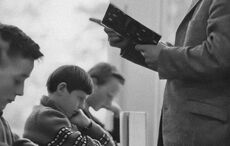I want to understand mermaids, and I suspect Nuala Ní Dhomhnaill might be one.
The Irish poet around whom all other Irish poets school - as readers and translators - came to NYU's Ireland House on a torrential night of rain this Saturday past.
We came to hear her talk about and read from her new book, The Fifty Minute Mermaid. She spoke in two languages. Her primary language is Irish, which has as many words for water, as the Eskimo have for snow. She is immersed in the language as in an acquatic universe.
Her poetry catches listeners like Ogma, who would drag them by fish hooks chained from his own tongue to theirs.
I have very strange ideas about Nuala Ní Dhomhnaill. I only know her from the poems I've read and studied as my first real work at learning Irish.
She writes of tongues in Irish, where the word teanga, means both language and tongue. I imagine her tongue split in two as from a hook, like the divil that got away. Her books are like that, with Irish on one side and English translations on the other.
She said the Irish people lost something in translation. Imagine parents speaking nothing but broken English to their children, lest they be infected with the disease of their own language. Much feeling that once had voice, was lost in the broken language. This was how Irish was taken from so many Irish people in the years of independence, in the wake of the famine. Shame shut Irish out, cut off their tails, and left them afraid of the water, on an island, that once enjoyed a native haute cuisine of fish.
The poems Nuala Ní Dhomhnaill read were like magical medical reports on the trauma done mermaids. It was a fifty minute therapy session, as the book she read from--Fifty Minute Mermaid--is a diagnosis by a poet with enormous imagination.
Anyone possessing any familiarity of Irish literature, knows Nuala Ní Dhomhnaill, the modern poet whose work has been translated from the original Irish in which she thinks and creates, into English by the likes of Séamus Heaney, Paul Muldoon and Ciarán Carson, and by other luminaries of contemporary Irish literature. It is through Nuala Ní Dhomhnaill and her translators, that we see splayed, the strange liminal condition of Irish letters.
The community of Irish speakers love poetry, the way the musicians have created a community around the music.
I will always remember my few moments with Nuala Ní Dhomhnaill at the reading, but I can remember only so much. To remember more, I'll turn to the community. The community helps with memory. Together we create it, and make moments permanent. Ní Dhomhnaill said such of her own work to remember the community in Kerry where she was first immersed in Irish, and which she remembers like an amoeba, where cúlchaint would flow from one end of the baile to the other in a flash as quick as electricity runs up neurons. That's why events are so important.
The group of us concentrate together on the poet's poetry, and receive the incantation, so that something stirs - if only phantom pains - and might even grow back in us, as on a cut aquatic organism. The Irish that was taken from us, like in circumcision, or whatever the castration term is for the removal of tails, has the strange capacity to grow back in gabbering amoebic communion.
It all helps us remember more, to recall and witness together, and I will follow up this report with interviews with Joseph Lee, Hilary Mhic Suibhne and Art Hughes, who organized Nuala Ní Dhomhnaill's coming to New York, after a three year hiatus.
Joseph Lee and I spoke a bit about Daniel Cassidy's book on New York slang which is riddled with Irish Gaelic, as it is by Yiddish. The Yiddish sources are newer, and remembered better. The Irish sources of our New York speech, are being remembered now, you dig? Diggin tú? An dtuigeann tú?
I also heard news from Art Hughes, that his translations of Ní Dhomhnaill into Breton and French will soon be available - an exciting prospect from the publisher at Ben Madigan Press.
Ní Dhomhnaill read poems in both languages, first in English as translated from her originals by Paul Muldoon, and then from the Irish source she wrote, making the poems more accessible to a learner like me, grappling to catch the slippery meanings with my clumsy paws.
Bi-lingual Irish events work very well in New York, because the Irish is so musical as independent sound-making. And when meaning breaks through the music in language understood, this is magic, and it's particularly emotional magic to have that breakthrough in Irish. It's like all the feelings that were cut off from consciousness in the language shift, come flooding back to sweep a person out to sea, and take him down with the shelties, home into the deep.
The event was organized to bring back to us, in memory, the figure of Barra Ó Donnabháin, who was in love with Nuala Ní Dhomhnaill. We learned about him, or were reminded of him, by Hilary Mhic Suibhne, who writes Hilary NY, a blog in Irish about our community, of which Barra was so central a figure. His death was a great loss, but Hilary Mhic Suibhne is among that devoted group who have gathered his rich Irish essays from his column Macalla - Echo - into a book called Súil Siar, available here. This was as much his night, as it was Nuala Ní Dhomhnaill's, whom he honored in his lifetime as a teacher and writer, for the radical and immeasurable contribution she has made to Irish literature. His death in 2003 was a major loss to the community, and yet, he is not lost, because we make him permanent in the organism of a gathered pobal swimming with Nuala Ní Dhomhnaill.




Comments